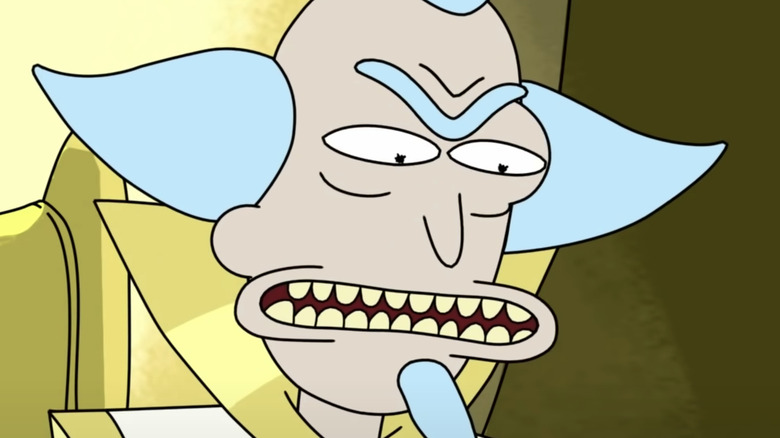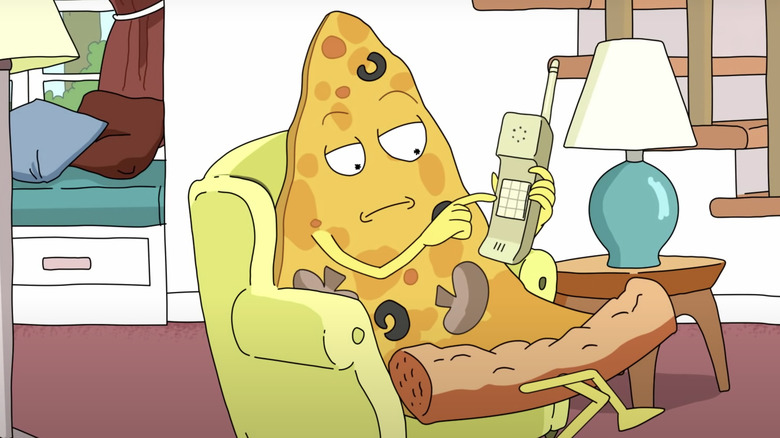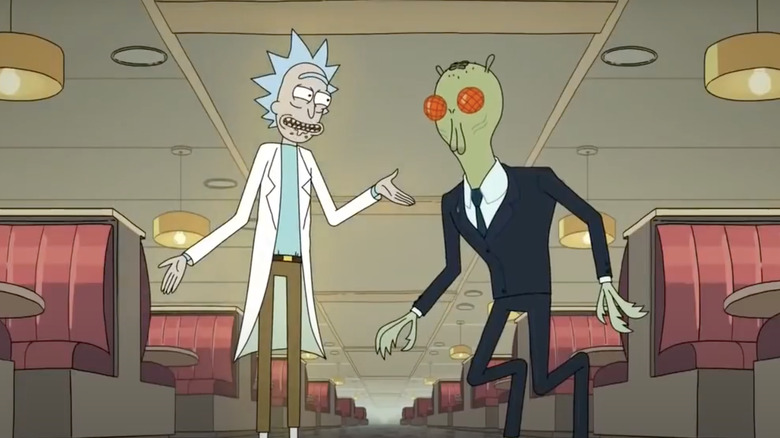One Of The Best Bits In Rick And Morty According To Reddit
From the heartbreaking beats to the blood-splattering sequences you're amazed someone signed off on, "Rick and Morty" is littered with moments that stand as highlights for Adult Swim's unashamedly out-there series about a kid and his dimensional-jumping grandfather. In fact, for many fans, picking out the best bit of the show's now five-season run can be a significant challenge. If it's not the classic reference to Stephen King's Langoliers, it's the guest appearance of rap icon and actor Ice-T (albeit one he didn't know about), or Keith David's Rick-hating President. For some fans, it's one sequence in particular during the show's early years that stands apart from everything that came before and after.
Plenty of iconic animated shows have stretched gags out beyond the reasonable length. The Griffin family has thrown up on screen more times than you care to count in "Family Guy," and one of "The Simpsons" most memorable laughs is seeing Sideshow Bob (Kelsey Grammer) stepping on a shed full of garden rakes. "Rick and Morty" is also undoubtedly guilty of dragging out one particular gag. This gag just so happens to be twisted into a bizarre but brilliant display that combines a piece of furniture with a phone and a slice of pizza.
Fans think that the escape from the Council of Ricks is an all-time great
"Rick and Morty" Season 1, Episode 10 ("Close Rick-counters of the Rick Kind") sees our universe's Rick (Justin Roiland) and Morty (also Roiland) flee the Council of Ricks only to wind up in various dimensions that are exactly the same, besides a specific object being sentient, and with a hunger for people, or chairs, or phones. Committing to the gag that is tweaked slightly in every scene just makes for the sort of "Rick and Morty" gold that fans have loved since the series began. Indeed, this scene perfectly encapsulates everything the bonkers show is all about.
On the r/RickandMorty subreddit page, u/Melon wrote, "I don't know why this was the best bit to me," and u/1Zer0Her0 added, "I fully believe this is one of the best bits of the show." It's certainly a stand-out sequence and one that has led some fans down a rabbit hole that is understandably hard to escape. In fact, u/infamousDiego proved this by making a rather strange, but equally valid point: "This is definitely me overthinking this, but nobody ordered pizza on a pizza. So why would they order people on people? That's just like ordering smaller pizzas on your pizza!" While this specific dimensional take-out discussion might be too much, the joke itself works well because it follows a very well-known structure. In fact, it's a structure that even our favorite mad scientist actually highlights a whole two seasons later.
Rick's dimensional escape follows the rule of three
As wild as this chase is that sees Rick outrun his own self, the brilliance of the Pizza, Phone, and Furniture bit is that it follows a classic route applied in comedy — the rule of three, or what's also known as a comic triple (via TV Tropes). In this case, it's the three different worlds Rick and Morty run through, each more absurd than the last. What's interesting is that this exact formula is one Rick is trained in.
In Season 3, Episode 1 ("The Rickshank Rickdemption"), Rick threatens his captor, Cornvelious Daniel (Nathan Fillion), with obtaining all the useless knowledge he doesn't need. Among this mental dustbin Daniel is left with, he dumps six years of comedy workshops where he learned that "comedy comes in threes." For series creator Dan Harmon, this is an important tool that his career couldn't be without. In fact, if you watch "Rick and Morty" often enough, you'll see this rule practiced a number of times.
Interestingly, Harmon's dedication to his craft has even led Justin Roiland to admit that he has seen a gradual merging between the real-life Harmon and the fictional Rick. Speaking to GQ, Roiland acknowledged, "There's a lot of Dan in Rick. A lot. It's gotten so bad that since season two, I've accidentally started calling Dan 'Rick.'" Appropriately, this episode mixes the god complex of the fictional scientist with the apparent god complex of his creator, and it's put into effect perfectly here — with space for a side of rotary and payphone on half.


